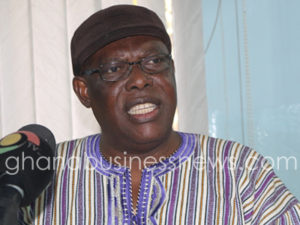Sourcing news from social media dangerous – NMC Chair

Sourcing news from social media, by mainstream journalists is dangerous, Mr Kwasi Gyan-Apenteng, the Chairman of the National Media Commission (NMC), has said.
He however, acknowledged that social media would play a critical role towards the November 7 General Elections in Ghana.
“In this election year, social media has become part of both the real campaign and the shadowy political war of attrition being waged by the two main political parties in Ghana on the internet,” he said, explaining that it was very difficult now to tell the truth from fabrication, especially of material emanating from political parties.
Mr Gyan-Apenteng, who was addressing the Third Annual Psychology Conference of the Ghana Psychology Association (GPA), University of Ghana, said: “The solution is to provide immediate and the timely release of information on official platforms in order to minimise and possibly eradicate mischief making from our information contexts,”
The conference was on the theme “Social Media in Contemporary Societies: Effects on the Family, Organisation, Schools and Policies”.
Speaking on the impact of social media on mainstream media practice, the NMC Chairman said, one obvious effect of the misuse of social media was a heightened sense of unease among the population.
He said information carried in the mainstream media were often credible because it had been worked out on and hopefully checked by a number of professional people, while social media was mostly the opposite.
Mr Gyan-Apenteng said the danger arises when journalists of the mainstream media also take their sources from social media.
“Today, one clear effect of social media on mainstream media is speed. Because of the rapidity within which news spreads on social media, traditional media is often tempted to sacrifice its fact checking duties in order to join the news stampede,” he said.
“The rush to publish does not only sacrifice the checking of facts, it also leads to one-sided stories without verification or collaboration.”
Mr Gyan-Apenteng also cited information on social media, on Monday, April 25, which said a rainstorm was heading to Ghana from Benin, which turned out to be hoax.
“None of the above should be taken to mean a blanket indictment of social media, as a source. Indeed, many journalists use social media to break their news; an example is the Haiti earthquake in 2010, which was broken on twitter”.
He said, to society as a whole, social media had been a blessing in many ways, explaining that there were huge benefits derived from social media, especially for young people, such as exploring the world, relationships, and most importantly network into the governance structures of their communities and countries.
“It is the unprofessional use and unmediated use of social media content that is causing us all so much anxiety,” he said.
Mr Edward Ato Sarpong, a Deputy Minister for Communications, noted that social media had brought about citizen journalism and collective responsibility but could create abuse of freedom and virtual retaliation.
Professor Ama de-Graft Aikins, the Vice Dean, School of Graduate Studies, University of Ghana, speaking on social media and mental health in Ghana, said depression and sleep problems were common among people who use social media.
Prof Christopher Charles Mate-Kole, the President of GPA, also said despite all the numerous advantages of SM, it had some challenges; hence the need for psychologists to take a critical look at it.
Source: GNA
